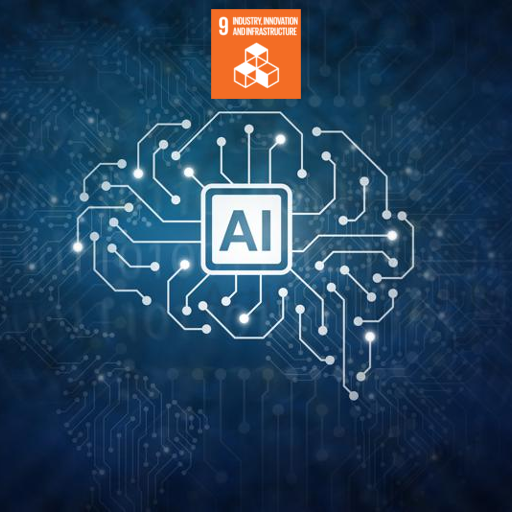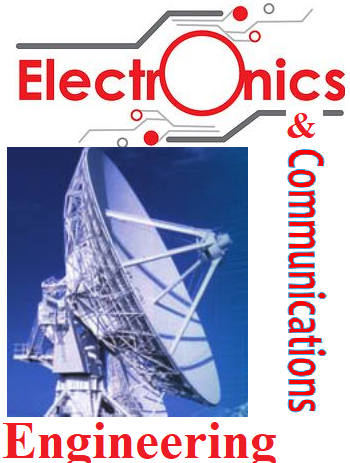SDG9 - INDUSTRY,INNOVATION AND INFRASTRUCTURE
المقررات الدراسية موسومة بـ "SDG9 - INDUSTRY,INNOVATION AND INFRASTRUCTURE"

- This course is a universal repository for all courses at MSA with a large number of potential AI topics.
- Coordinators of different courses at MSA faculties can use any subset of such topics in their respective courses as long as the courses specifications allow (directly or indirectly).
- Coordinators of all courses at MSA faculties are encouraged to import any topic(s), activity(s), and/or resource(s) they like from this course to their respective courses.
- Teacher: Islam ElShaarawy
- Teacher: Ali Hamed Bastawesy
- Teacher: computer science MSA
- Teacher: Hesham Abdel Hamed Emam Mansour
- Teacher: Hanaa Abdelahad Elsaeed Abdelkader
- Teacher: Ali Hamed Bastawesy
- Teacher: Abdel-Moniem Helmy Ismail Abdel-Hafez
- Teacher: computer science MSA
- Teacher: Bahaa Shabana
- Teacher: Hanan Tarek Abdullah Maroof
- Teacher: Nour Saad Zawawi
- Teacher: Zeinab Abd El Halim Taha El Maboud
- Teacher: Mohamed Elsayed Ghoneimy Mohamed
- Teacher: Raghda Essam Abd El-Razek Ali
- Teacher: Ali Hamed Bastawesy
- Teacher: Wael Hassan Gomaa
- Teacher: Reem Kadry
- Teacher: computer science MSA
- Teacher: Mariam Osama Abo Ghonima Kottb
- Teacher: Hanan Tarek Abdullah Maroof
- Teacher: Momen Zaher
- Teacher: Nour Saad Zawawi
- Teacher: Zeinab Abd El Halim Taha El Maboud
- Teacher: Hesham Abdel Hamed Emam Mansour
- Teacher: Hanaa Abdelahad Elsaeed Abdelkader
- Teacher: Nadeen Amgad Mahmoud Mohamed
- Teacher: Ali Hamed Bastawesy
- Teacher: computer science MSA
- Teacher: Marwa Mohamed Solayman Taha
- Teacher: Mohab Sameh Ibrahim Abd Elwahab
- Teacher: Hanan Tarek Abdullah Maroof
- Teacher: Nour Saad Zawawi
- Teacher: Zeinab Abd El Halim Taha El Maboud
- Teacher: Hesham Abdel Hamed Emam Mansour
- Teacher: Ali Hamed Bastawesy
- Teacher: Mostafa Hassan Mostafa Hassan
- Teacher: computer science MSA
- Teacher: Mohab Sameh Ibrahim Abd Elwahab
- Teacher: Momen Zaher
- Teacher: Nour Saad Zawawi

- Teacher: Zeinab Abd El Halim Taha El Maboud
- Teacher: Noha Ahmed Saad El-Dien El-Sayed
- Teacher: Dr.Farid Ali
- Teacher: Islam ElShaarawy
- Teacher: Abdelrahman Ezzeldin Naguib
- Teacher: Ali Hamed Bastawesy
- Teacher: computer science MSA
- Teacher: Rana Reda El-Sayed Abdallah Waly
- Teacher: Hesham Abdel Hamed Emam Mansour
- Teacher: Raghda Essam Abd El-Razek Ali
- Teacher: Ali Hamed Bastawesy
- Teacher: Mostafa Hassan Mostafa Hassan
- Teacher: computer science MSA
- Teacher: Ahmed Mohamed Mohamed Mostafa Neil
- Teacher: Ahmed Mostafa Abd Elaal
- Teacher: Moataz Samy
- Teacher: Hanan Tarek Abdullah Maroof
- Teacher: Momen Zaher
- Teacher: Zeinab Abd El Halim Taha El Maboud
- Teacher: Hesham Abdel Hamed Emam Mansour
- Teacher: Nadeen Amgad Mahmoud Mohamed
- Teacher: Ali Hamed Bastawesy
- Teacher: Rahma Hussein Eid
- Teacher: Reem Kadry
- Teacher: computer science MSA
- Teacher: Momen Zaher
- Teacher: Nour Saad Zawawi

- Teacher: Zeinab Abd El Halim Taha El Maboud
- Teacher: Noha Ahmed Saad El-Dien El-Sayed
- Teacher: Islam ElShaarawy
- Teacher: Salma Gabr Abdelghany Gabr
- Teacher: Ali Hamdi Fergany Ali
- Teacher: Ali Hamed Bastawesy
- Teacher: Dr.Mohamed Hassan Mahmoud Elgazzar
- Teacher: computer science MSA
- Teacher: Ahmed Mahmoud Mohamed Mohamed Elshafee
- Teacher: Fatma Mohamed Kilany
- Teacher: Mohab Sameh Ibrahim Abd Elwahab
- Teacher: Ahmed Yasser Ahmed Abdelaziz
- Teacher: Nour Saad Zawawi

- Teacher: Islam ElShaarawy
- Teacher: Ali Hamed Bastawesy
- Teacher: computer science MSA
- Teacher: Nour Saad Zawawi

- Teacher: Zeinab Abd El Halim Taha El Maboud
- Teacher: Noha Ahmed Saad El-Dien El-Sayed
- Teacher: Dr.Farid Ali
- Teacher: Dr.Yasmine Eid Yousef
- Teacher: Islam ElShaarawy
- Teacher: Abdelrahman Ezzeldin Naguib
- Teacher: Ali Hamed Bastawesy
- Teacher: computer science MSA
- Teacher: Dr.Ayat Mahmoud
- Teacher: Nour Saad Zawawi
- Teacher: Zeinab Abd El Halim Taha El Maboud
- Teacher: Maryam Ahmed Hassnin
- Teacher: Yasmine Ahmed Mohamed Abd Elaal
- Teacher: Mahmoud Ahmed Saleheldin
- Teacher: Dr.Farid Ali
- Teacher: Yousef Amr Abdelhalim Abbas
- Teacher: Dr.Ehab Emam Zakaria
- Teacher: Maria Fayez Halem
- Teacher: Ali Hamed Bastawesy
- Teacher: Sara Hani Ibrahim Desouki
- Teacher: computer science MSA
- Teacher: Habiba Mohamed Mosa Ali
- Teacher: Tamer Moneir Mousa Nassef
- Teacher: Mohamed Nagy Saad
- Teacher: Zeinab Abd El Halim Taha El Maboud
- Teacher: Dr.Farid Ali
- Teacher: Nourhan Amgad Morsy
- Teacher: Youssef Araby Youssef Mohamed
- Teacher: Dr.Yasmine Eid Yousef
- Teacher: Dr.Ehab Emam Zakaria
- Teacher: Omnia Fawzy Mahjob Mohamed
- Teacher: Ali Hamdi Fergany Ali
- Teacher: Ali Hamed Bastawesy
- Teacher: Mahmoud Hossam Mohamed Mohamed
- Teacher: computer science MSA
- Teacher: Hatem Mohamed Mohamed Ibrahim Elattar
- Teacher: Ammar Prof. Mohammed Ammar
- Teacher: Rana Reda El-Sayed Abdallah Waly
A second Database Course; aims at building a concrete foundation and solid/professional knowledge in building, administer, and maintain Database Management Systems. Students will understand also the advanced and modern topics in database systems
- Prof. Ali El-Bastawissy: Zeinab Abd El Halim Taha El Maboud
- Prof. Ali El-Bastawissy: Nourhan Amgad Morsy
- Teacher: Ali Hamed Bastawesy
- Prof. Ali El-Bastawissy: Wael Hassan Gomaa
- Prof. Ali El-Bastawissy: Bassandh Hesham Moawad
- Prof. Ali El-Bastawissy: Reem Kadry
- Teacher: computer science MSA
- Prof. Ali El-Bastawissy: Dr.Ayat Mahmoud
- Prof. Ali El-Bastawissy: Mariam Osama Abo Ghonima Kottb
- Prof. Ali El-Bastawissy: Momen Zaher
This is a core module for web programming. The student will learn the client-side aspect of web programming. The topics will cover different client-based techniques and their applications in real world. Emphasis will be made on Markup and Scripting languages and their use in web applications.
- Teacher: Hesham Abdel Hamed Emam Mansour
- Teacher: Dr.Ibrahim Abdelrahman
- Teacher: Maryam Ahmed Hassnin
- Teacher: Ibrahim Eldesoky Fatouh
- Teacher: Raghda Essam Abd El-Razek Ali
- Teacher: Dr.Sherin Farid
- Teacher: Rofida Gamal Mohamed Mahmoud
- Teacher: Dr. Mohammad Ghoniem
- Teacher: Ali Hamed Bastawesy
- Teacher: Sara Hani Ibrahim Desouki
- Teacher: Mennatallah Khaled Nasr-Eldin Ahmed Sawy
- Teacher: computer science MSA
- Teacher: Dr.Sherine Mohamed
- Teacher: Nehal Mohamed Abdelhamied Ali
- Teacher: Ibrahim Mohamed Ibrahim
- Teacher: Fatma Mohamed Kilany
- Teacher: Ahmed Mostafa Abd Elaal
- Teacher: Moataz Samy
- Teacher: Hanan Tarek Abdullah Maroof
- Teacher: Ahmed Yasser Ahmed Abdelaziz
- Teacher: Heba Youssef Mohamed
- Teacher: Momen Zaher
Summary:
This module is designed to introduce the students to the activities involved in a software development project. The module follows an object-oriented approach, compatible with leading programming languages such as Java, C++ and C#.
Students will be introduced to the principles of software engineering: Requirements, analysis, design and testing. We will also review of principles of object orientation, agile software development, software development life cycle, object oriented analysis, design using UML, Design Patterns and Software testing.
The module project will help the students learn how to work as a team for developing properly designed and documented software systems.

- Teacher: Mohamed Abd Elraouf Abdeen
- Teacher: Hesham Abdel Hamed Emam Mansour
- Teacher: Hanaa Abdelahad Elsaeed Abdelkader
- Teacher: Raghda Essam Abd El-Razek Ali
- Teacher: Ayman Ezzat Atia
- Teacher: Ali Hamed Bastawesy
- Teacher: Dr.Mohamed Hassan Mahmoud Elgazzar
- Teacher: Abdel-Moniem Helmy Ismail Abdel-Hafez
- Teacher: Reem Kadry
- Teacher: Dr.Mohamed Labib
- Teacher: computer science MSA
- Teacher: Marwa Mohamed Solayman Taha
- Teacher: Ahmed Mostafa Abd Elaal
- Teacher: Hanan Tarek Abdullah Maroof
- Teacher: Momen Zaher
- Teacher: Hanaa Abdelahad Elsaeed Abdelkader
- Teacher: Dr.Ibrahim Abdelrahman
- Teacher: Yasmine Abou Ouf Hamed
- Teacher: Samar Adel
- Teacher: Maryam Ahmed Hassnin
- Teacher: Yasmine Ahmed Mohamed Abd Elaal
- Teacher: Youssef Amr Mahmoud Naga
- Teacher: Dr.Yasmine Eid Yousef
- Teacher: Ibrahim Eldesoky Fatouh
- Teacher: Bassant Essam El-Din Mosallam
- Teacher: Ali Hamed Bastawesy
- Teacher: Wael Hassan Gomaa
- Teacher: Bassandh Hesham Moawad
- Teacher: Dr.Mohamed Labib
- Teacher: computer science MSA
- Teacher: Hanan Mohamed Alkholy
- Teacher: Rodaina Mohamed Saad Elsaeed Hebishy
- Teacher: Doaa Rafat Mahmoud Mohammad
Aims The main objective of this module is to introduce important concepts of modern operating systems including processes, concurrent processes, inter-process communication, synchronization, process scheduling and deadlocks, memory management, swapping, paging, segmentation and virtual memory. Also file systems and its implementation besides the input-output systems and mass storage structure. Learning outcomes Knowledge On completion of this module, the successful student will be able to: • Demonstrate the structure and functions of an operating system. (1) • Illustrate the methods of process management, CPU scheduling and process synchronization. (2) • Characterize what are deadlocks and how they are handled. (3) • Describe memory organization and explain memory management techniques. (4) • Compare between different operating systems. (5) Skills This module will call for the successful student to: • Expertly use any operating system environment. (6) • Create any operating system component. (7) • Solve some of the common operating systems problems such as: deadlock, synchronization…etc. (8) Syllabus • Operating-System Structures. • Process Management. • CPU Scheduling. • Process Synchronization. • Deadlocks. • Memory Management. • Virtual Memory. • File System interface. • File System Implementation. • Mass Storage Structure. • I/O Systems. TEACHING/LEARNING STRATEGIES • Weekly lectures to introduce the basic concepts of the course subjects. • Weekly computer laboratory to use readymade software to apply the concepts of Neural Networks to solving problems. • Class presentations the student will be assigned a specific subject to investigate in depth and make in class presentation. Assessment Scheme • Unseen Examinations 60 % • Coursework 40% Learning materials • Operating Systems Concepts, 8th ed. Abraham Silberschatz, Peter Bear, Galvin Greg Gagne, John Wiley & Sons, 2008.
- Teacher: Zeinab Abd El Halim Taha El Maboud
- Teacher: Maryam Ahmed Hassnin
- Teacher: Sama Ehab Said Ashour
- Teacher: Dr.Yasmine Eid Yousef
- Teacher: Mohamed Elsayed Ghoneimy Mohamed
- Teacher: Bassant Essam El-Din Mosallam
- Teacher: Ali Hamed Bastawesy
- Teacher: Wael Hassan Gomaa
- Teacher: Bassandh Hesham Moawad
- Teacher: computer science MSA
- Teacher: Ahmed Mohamed Mohamed Mostafa Neil
- Teacher: Doaa Rafat Mahmoud Mohammad
- Teacher: Heba Youssef Mohamed
- Teacher: Maha hatem Mohamed
The Mechanics 1 (Statics) module is designed to cover:
- Units and Forces
- Statics of Particles: Plane
- Statics of Particles: Space
- Statics of Rigid Bodies: Vector Product
- Statics of Rigid Bodies: Moments, Moment – Couple and Wrench
- 2-D Equilibrium Structure
- 3-D Equilibrium Structure
- 2-D Centroids and Center of Gravity, 3-D Centroids and Center of Gravity
- 2-D Moment of Inertia, 3-D Moment of Inertia, Real Case Studies.
- Teacher: Hossam Abd Elghaffar
- Teacher: Adham Ahmed Elsayed Abdelmagid
- Teacher: Fatma Elzahraa Basyony Ismail
- Teacher: Diaa Hafez
- Teacher: Maha Ibrahim
- Teacher: Maysa Mahmoud Fathy Omar
- Teacher: Dr.Nabila Nowaira
- Teacher: Prof.Dr.Hafez Radi
- Teacher: Prof.Nahed Sobhi abd elnour
- Teacher: Mona afifi
- Teacher: Nehal Abd El Wahab Amer
- Teacher: Salwa Abdel Moniem Yassen El Gindi
- Teacher: Rana Adel Ibrahim Zaki
- Teacher: Lobna Ahmed Galal
- Teacher: Eman Ahmed Saleh
- Teacher: Doaa Esmat Hassan
- Teacher: Diaa Hafez
- Teacher: Mona Hassan Huseein Sakr
- Teacher: Arwa Hussein Abdillatif
- Teacher: Nermine Ibrahim Nofal
- Teacher: Omnia Magdy Ismail Saber Attalaah
- Teacher: Maysa Mahmoud Fathy Omar
- Teacher: Yosra Mohamed Ahmed Ahmed
- Teacher: Merna Mohamed Reda
- Teacher: Mona Mostafa Amin Mostafa
- Teacher: Dr.Nabila Nowaira
- Teacher: Prof.Dr.Hafez Radi
- Teacher: Alaa Sayed Mahmoud
- Teacher: Dr.Shady Shawky Saifelnasr
- Teacher: Al Shimaa Galal Al Din
- Teacher: Prof.Nahed Sobhi abd elnour
- Teacher: Dr.Rania ahmed hamdi abdel moneim el meseidy
- Teacher: Salwa Abdel Moniem Yassen El Gindi
- Teacher: Rana Adel Ibrahim Zaki
- Teacher: Dr.Alaa Adel Mahmoud Elsherif
- Teacher: Mai Adel Mohamed Ebaid
- Teacher: Lobna Ahmed Galal
- Teacher: Diaa Hafez
- Teacher: Mona Hassan Huseein Sakr
- Teacher: Shereen Hussein Abd El Fattah
- Teacher: Arwa Hussein Abdillatif
- Teacher: Nermine Ibrahim Nofal
- Teacher: Dr.Aya Magdi Younis
- Teacher: Maysa Mahmoud Fathy Omar
- Teacher: Yosra Mohamed Ahmed Ahmed
- Teacher: Rana Mohamed Hany Mohamed Fouad
- Teacher: Merna Mohamed Reda
- Teacher: Hend Mostafa Mohamed Mostafa
- Teacher: Nariman Nashaat Gamil
- Teacher: Dr.Nabila Nowaira
- Teacher: Prof.Dr.Hafez Radi
- Teacher: Alaa Sayed Mahmoud
- Teacher: Dr.Shady Shawky Saifelnasr
- Teacher: Al Shimaa Galal Al Din
- Teacher: Prof.Nahed Sobhi abd elnour
- Teacher: Dr.Rania ahmed hamdi abdel moneim el meseidy

- Teacher: Diaa Hafez
- Teacher: Nayera Hassan Ali Ibrahim
- Teacher: Ahmed M. D. E. Hassanein
- Teacher: Maysa Mahmoud Fathy Omar
- Teacher: Abdelrahman Mohamed Ali Hassan El-Akhdar
- Teacher: Dr.Nabila Nowaira
- Teacher: Farah Raad Kareem
- Teacher: Prof.Dr.Hafez Radi
- Teacher: Prof.Nahed Sobhi abd elnour
- Teacher: Nada Yasser Ahmed Salama
- Teacher: Mona afifi

This module is designed to enable students to cope up with new advances in research in electronics. It includes a review of Electronics available today and the new trends in Electronics research.
- Teacher: Mohamed Gamal Shafeek
- Teacher: Diaa Hafez
- Teacher: Ahmed M. D. E. Hassanein
- Teacher: Maysa Mahmoud Fathy Omar
- Teacher: Dr.Nabila Nowaira
- Teacher: Farah Raad Kareem
- Teacher: Prof.Dr.Hafez Radi
- Teacher: Prof.Nahed Sobhi abd elnour
- Teacher: Mona afifi

This module is designed to enable students to focus on the design and analysis of the active circuits, active filters, multiple feedback operational amplifiers, and multiple feedback filters. It also provides considerable understanding and confidence in Engineering Electronics and develops the intellectual and practical skills necessary for Electronics Engineering area.
- Teacher: Ahmed Gamal Ahmed Mohamed Elsherif
- Teacher: Diaa Hafez
- Teacher: Ahmed M. D. E. Hassanein
- Teacher: Maysa Mahmoud Fathy Omar
- Teacher: Dr.Maher Mohamed El-Tayeb
- Teacher: Nesma Nour
- Teacher: Dr.Nabila Nowaira
- Teacher: Farah Raad Kareem
- Teacher: Prof.Dr.Hafez Radi
- Teacher: Prof.Nahed Sobhi abd elnour
- Teacher: Mona afifi

This module is designed to enable students to cope up with new advances in research in Communication. It includes a review of Communications available today and advances in Communications research.
- Teacher: Nourhan Ahmed Yehia Saad Mahmoud Hassan
- Teacher: Ahmed Fawzy Daw / Dr
- Teacher: Diaa Hafez
- Teacher: Ahmed Hatem
- Teacher: Ahmed I. Ahmed
- Teacher: Dr.Samer Ibrahim Mohamed
- Teacher: Ahmed M. D. E. Hassanein
- Teacher: Maysa Mahmoud Fathy Omar
- Teacher: Shaymaa Mohamed Tayser El-Sayed
- Teacher: Dr.Nabila Nowaira
- Teacher: Farah Raad Kareem
- Teacher: Prof.Dr.Hafez Radi
- Teacher: Shahenaz Shokry
- Teacher: Prof.Nahed Sobhi abd elnour
- Teacher: Mona afifi